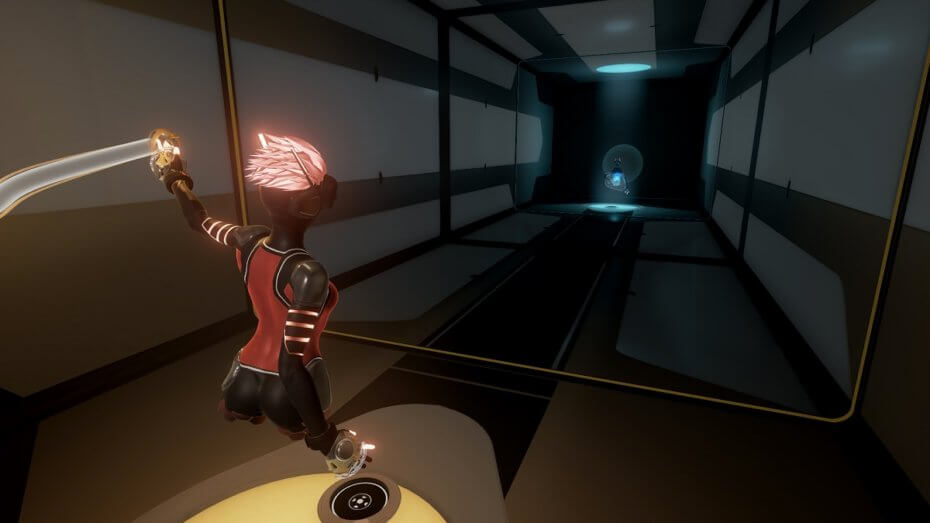
Eve Online creator CCP Games is 20 years old this year, but Iceland’s biggest game company is still reinventing itself. This week, the company announced its 12th virtual reality title, Sparc.
The game is a virtual sports title that is reminiscent of the disc-throwing scene in the film Tron. It’s just one more sign of how CCP is all-in when it comes to virtual reality. I talked about the game with Hilmar Veigar Pétursson, CEO of CCP Games, in an interview at the Game Developers Conference this week in San Francisco. Reykjavik, Iceland-based CCP has 359 employees, and its Atlanta, Ga.-based team made Sparc.
Meanwhile, the Eve Online science fiction universe is going strong in its 14th year, with more than 500,000 users and a new free-to-play business model for new recruits. That franchise has been extended into virtual reality, but with the sports title, Veigar Pétursson felt it was time to expand to a new intellectual property.
Sparc will debut in 2017 for the Oculus Rift, HTC Vive, and PlayStation VR. In the physical game, you will throw projectiles at your opponent and dodge incoming attacks by moving around in VR. Players will be able to join one-on-one matches with friends online or find opponents via matchmaking. It’s just the latest in the company’s obsession for the new medium of VR.
Here’s an edited transcript of our interview.

Image Credit: Dean Takahashi
GB: You have a new game coming, a disc-throwing game?
Hilmar Veigar Pétursson: Right. It’s a virtual sport, is how we refer to it. Currently it’s discs and shields. Maybe later we’ll add other elements, but that’s how it works now. We’re curious about this intersection of virtual and physical, moving around.
GB: Was it inspired something like Tron?
Pétursson: It’s inspired by a lot of experimentation we did with the team in Atlanta. First we started dabbling with Microsoft Kinect, using your hands and body to move. They made a whole host of experiments – throwing fireballs, playing instruments, throwing discs around. Later on the tracking controllers started to emerge. We were starting in 2013, before any of that had arrived. Then we saw, “Okay, we have a viable platform.”
That changed the experience a bit, though. Once you have equipment in your hands, it feels different. You want to make it more about the controllers and the triggers. This current incarnation is built around the feel of the controllers. It became about volleys and using the shield, different aspects of that. It’s more equipment-focused. It’s been a long journey of trying things and seeing what works. Then we added this IP on top, which is not really—it’s like a sport. Sports aren’t really an IP. They just are. It’s been a very organic process.
GB: It seems like the tech has gotten a lot more accurate over time.
Pétursson: The tracking is really good. There are always nuances to what you do, and the guys spend a lot of time making sure they’re playing to the strengths of the equipment.
GB: Is this for both Oculus and HTC?
Pétursson: Right. The idea is to launch across all platforms. That’s what we did with Valkyrie. Given then installed bases, it’s not good to subdivide a multiplayer game. Going across everything and allowing for cross play is the high-level plan.
GB: Is that easy to do, the cross-platform multiplayer?
Pétursson: It’s probably not easy, but our teams make it look easy, I think. [laughs] It’s possible, how about that? It’s not impossible. We did it in Valkyrie, obviously. We’ve gotten past the nuances of the different hardware. We know them pretty well by now. We know all the rules and preferences of all the platforms. We have a lot of organizational knowledge about these VR ecosystems built in. It’s a competitive advantage now. Leveraging that is definitely something we try to bring to our games. It’s important now in the early days of VR. You have to bring everyone along to get to critical mass.
GB: Was this funded by any particular partner? What’s the timing on it?
Pétursson: This one we’ve mostly done on our own. It’ll be this year for sure. Q3, plus-minus a bit? That’s the slot we’re thinking about. A lot…

